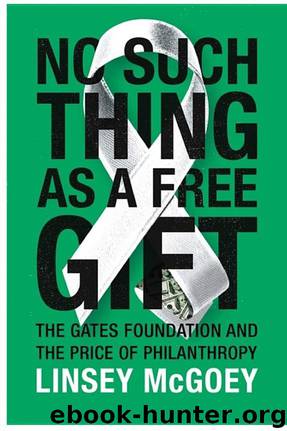No Such Thing as a Free Gift: The Gates Foundation and the Price of Philanthropy by Linsey McGoey

Author:Linsey McGoey [McGoey, Linsey]
Language: eng
Format: epub
Tags: Social Science, Philanthropy & Charity, Developing & Emerging Countries, Poverty & Homelessness
ISBN: 9781784780838
Google: jA_UBwAAQBAJ
Amazon: 1784780839
Publisher: Verso
Published: 2015-10-20T04:00:00+00:00
CHAPTER FIVE
God’s Work
For nearly two decades, the Gates Foundation has dedicated itself to battling some of the world’s deadliest diseases: over $1.5 billion spent to date on polio; over $2 billion invested in fighting malaria and tuberculosis; more than $2 billion spent fighting HIV/AIDS. The foundation’s annual spending on global health is comparable to the World Health Organization – and the foundation wields power accordingly, stipulating how and where other global health organizations should spend their money.
It wasn’t the first philanthropic organization to play a defining role in global heath. Huge advances in fighting infectious diseases, improving cancer treatments, and, today, making headway in the fight against HIV/AIDS would not have been possible without the support of organizations such as the Rockefeller Foundation and the Wellcome Trust – Britain’s largest charity, established in 1936 to administer the fortune of Henry Wellcome, a pharmaceutical tycoon.
For much of the twentieth century, the Rockefeller Foundation commanded the same authority now enjoyed by the Gates Foundation. It was a pioneer in the field of global health, provoking both adulation and – as the foundation’s ties to controversial US foreign policies grew more apparent – vehement public criticism in poor nations frustrated by US economic expansion. From 1913 to 1951, the Rockefeller Foundation’s health division operated in more than eighty countries. Its influence was not simply greater than other non-profits or government actors working in international health – it was, for a long spell, the sole major funder in this field.
The League of Nations Health Organization (LNHO) was founded in 1922. But unlike its successor, the World Health Organization, the LNHO was weak in both political clout and financial backing. For much of its existence, the LNHO was reliant on the Rockefeller Foundation for almost half of its budget. Indeed, as the historian Anne-Emanuelle Birn points out, the LNHO was partly modelled on the Rockefeller Foundation’s structure, sharing its values, expertise, and know-how in disease control.1
The WHO, first established in 1948, extended the functions of the LNHO. Until then, the Rockefeller Foundation was the de facto world authority in how best to manage the global disease burden, applying domestic US expertise in the treatment of scourges as varied as hookworm and polio across the globe. Foundation staff members were rarely far from controversy.
Take the example of Hideyo Noguchi, the Japanese-born scientist who would later die in Accra from yellow fever. Noguchi made his name with a series of experiments involving lutein, an inactive solution of Treponema pallidum, a bacterium that Noguchi had helped identify as the causative agent of syphilis. Historian of science Susan Lederer offers a compelling description of the medical optimism fuelled by Noguchi’s lutein tests – and the public outrage they generated. Noguchi was hopeful that tests using lutein in humans would serve as a powerful diagnostic tool, revealing the presence of syphilis at the congenital stage. Working with over a dozen physicians across the New York metropolitan area, Noguchi performed lutein tests on hundreds of subjects, including healthy children between the
Download
This site does not store any files on its server. We only index and link to content provided by other sites. Please contact the content providers to delete copyright contents if any and email us, we'll remove relevant links or contents immediately.
Cecilia; Or, Memoirs of an Heiress — Volume 1 by Fanny Burney(32558)
The Great Music City by Andrea Baker(32019)
Cecilia; Or, Memoirs of an Heiress — Volume 2 by Fanny Burney(31956)
Cecilia; Or, Memoirs of an Heiress — Volume 3 by Fanny Burney(31942)
We're Going to Need More Wine by Gabrielle Union(19046)
All the Missing Girls by Megan Miranda(16027)
Pimp by Iceberg Slim(14507)
For the Love of Europe by Rick Steves(14121)
Bombshells: Glamour Girls of a Lifetime by Sullivan Steve(14075)
Talking to Strangers by Malcolm Gladwell(13370)
Norse Mythology by Gaiman Neil(13365)
Fifty Shades Freed by E L James(13241)
Mindhunter: Inside the FBI's Elite Serial Crime Unit by John E. Douglas & Mark Olshaker(9343)
Crazy Rich Asians by Kevin Kwan(9292)
The Lost Art of Listening by Michael P. Nichols(7506)
Enlightenment Now: The Case for Reason, Science, Humanism, and Progress by Steven Pinker(7313)
The Four Agreements by Don Miguel Ruiz(6765)
Bad Blood by John Carreyrou(6621)
Weapons of Math Destruction by Cathy O'Neil(6280)
